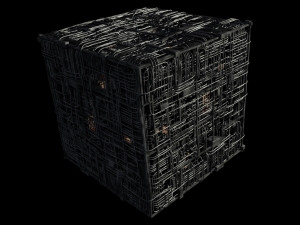
There's been a lot of controversy this week around Facebook losing a bunch of local users. In summary: a social media analytics portal declared 900 000 South Africans had stopped using the platform. Local analyst Arthur Goldstuck argued that this was not an accurate assessment, since the numbers do not reflect mobile users. Facebook then confirmed the social network is still seeing constant growth locally. "We are now at more than 9.5 million monthly actives of which more than 50% are on Facebook every single day," it told Gorilla Creative Media.
Let us pause for a second here to consider this.
Nine point five million local users.
Of which more than half visit that one Web site every single day.
Social media and the Internet can do a lot of good - but I think we have to be careful not to become the mindless drones that fiction has predicted.
Regardless of whether membership is dropping by a few percent or growing, that's still an incredibly large number. We only have 50 million people in our entire country. That means that if you're walking down the street and you've seen more than five people, statistically you've probably seen someone who uses Facebook.
In total, Facebook has over one billion active users. That's a significant chunk of the world's population (now at seven billion). In fact, if Facebook were a country, it would be the third largest in the world (China has a population of 1.34 billion).
That's a lot of people connected together, sharing the same ideas and conversations.
Isn't that more than a little terrifying?
We are the hive mind. We are Borg. You will be assimilated. Resistance is futile.
In science fiction, the hive mind is always portrayed as the enemy. The biggest nemesis in Star Trek, spanning multiple series, was The Borg. The Machines in the Matrix trilogy, The Cybermen (and The Daleks) in Doctor Who, the Xenomorph race in Alien, the Replicators in Stargate SG-1 all fall under the same heading, according to Wikipedia, which describes a hive mind as "a group mind with almost complete loss (or lack) of individual identity".
In many ways our world is becoming the stuff of science fiction; with mobile phones and tablets in our pockets, the vast knowledge of the Internet at our fingertips, and every day tools like teleconferencing and voice control. In fact, sci-fi has been great at predicting science fact. Credit cards were envisioned in Edward Bellamy's Looking Backward in 1888, HG Wells predicted the Atomic Bomb in 1914, and the Internet was conceptualised by Mark Twain in The London Times in 1904. You have to step back every so often and be amazed at how far we've come. But you also have to ask: where are we going?
In many of the possible futures dreamed up in science fiction, the great enemy begins as something useful. Something we love. Skynet was built to service the humans. Cylons were created to service aliens. The consistent thread that runs through these stories is our own creation taking over and becoming the enemy.
!["...and on that day, men will become as gods." [source: http://tardis.wikia.com/wiki/Creation_of_the_Daleks]](https://www.itweb.co.za/static/pictures/2013/04/resized/Genesisofthedaleks.xl.jpg)
I'm a social media manager, so I'm the last to say that social networking is evil. I'm also an optimist. I can see all the good it's doing. I regularly crowdsource ideas from my friends, I enjoy being in touch with brands, I love having my finger on the pulse of the world. Social media makes me feel bigger than myself. It makes me feel like I can see and experience more and, through my contacts, know more. In many ways it may be all about the "I", the cult of the personality, the me culture. But in many more ways it's about the group, the community, the collective.
Social media and the Internet can do a lot of good - but I think we have to be careful not to become the mindless drones that fiction has predicted. We need to concentrate on maintaining our individuality.
I know that I personally find it difficult. I want to follow people who share my world view and I get swept up in the excitement of trending topics and debates. The temptation is to give in to group think, to agree with the majority, to do whatever those I'm connected to believe is right. And that's the most frightening thing. In fiction, the enemy is a cyber being with malevolent intentions. In real life? It's myself.
At our core, human beings are social creatures. Is it any wonder that we flock to a technology that enhances our ability to be social? Our social nature has allowed us to construct vast empires, achieve amazing things. If we could do that before it was so easy to share ideas, I'd love to think what we are capable of now. But innovation requires the drive to be different. I hope we don't lose that drive while we're busy sharing cat pictures and the latest celeb gossip.
Share